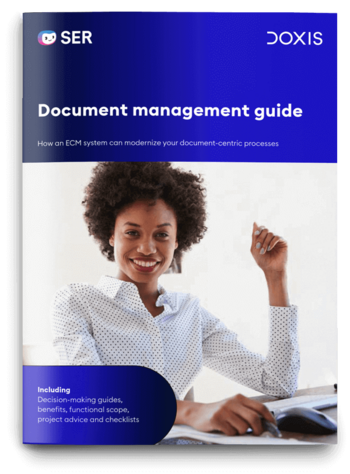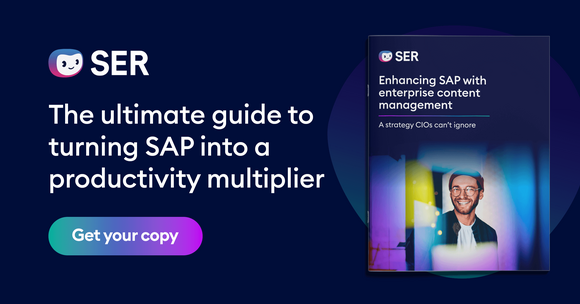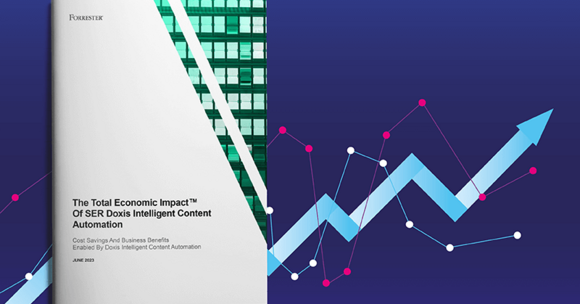SER Blog Customer Stories & Use Cases
Everything you need to know about the Dubai Paperless Strategy
Victoria McEwan
In recent years, Dubai has taken significant strides toward a more efficient and sustainable future through its innovative Dubai Paperless Strategy. This groundbreaking initiative aims to revolutionize the way government services are delivered, leveraging cutting-edge technologies like blockchain and artificial intelligence to reduce paper consumption, improve citizen satisfaction, increase efficiency and reduce administrative processes. In this article, we'll explore:
- What is the Dubai paperless strategy?
- What are the goals of the paperless strategy?
- Key facts about Dubai’s paperless strategy
- Has the strategy been successful?
- How is the private sector affected?
- How to start your journey to becoming a paperless company

What is the Dubai paperless strategy?
The Dubai paperless strategy was introduced to create a perfectly integrated paperless government framework, with a government administration that sets solid plans and strategies to secure people’s happiness, develop communities to meet the requirements and set standards for cities of the future. The strategy was introduced to eliminate over one billion paper documents used in Dubai government transactions.
Sheikh Hamdan bin Mohammed bin Rashid Al Maktoum, Crown Prince of Dubai and Chairman of the Dubai Executive Council, who launched the strategy, spoke about the vision:
"After 2021, no employee or customer of the Government of Dubai will need to print any paper document. This reflects our holistic vision for our role as human beings, not only towards Dubai, but towards the world as a whole. The Dubai Paperless Strategy will eliminate over one billion paper documents annually used today in Dubai government transactions."
What are the goals of the Dubai paperless strategy?
The goals of the Dubai paperless strategy are to:
- Reduce paper consumption
- Simplify administrative processes
- Increase efficiency
- Improve citizen satisfaction
- Promote innovation
The strategy falls in line with the vision of Sheikh Mohammed bin Rashid Al Maktoum, VP and Prime Minister of the UAE and his plan to transform Dubai into a fully-fledged smart city and reinforces Dubai’s status as a world-leading capital and role model in government operations and services that enhance customer happiness. The strategy saves over 1 billion sheets of paper every year.
Key facts about the Dubai paperless strategy
Digitization of government services
Dubai is building a future without paper through the comprehensive digitization of a wide range of government services, from healthcare and education to business registration and licensing. Interactions with the government services are simple through the DubaiNow application.
By eliminating 1 billion sheets of paper used by the government each year, the money saved is enough to feed 4 million children, prevent 130,000 trees from being cut down, and save 40 hours of productivity to give people more time to spend doing what they love.
The '100% Paperless' stamp
The ‘100% Paperless' stamp initiative is part of the ‘Government Development Track’. Awarded to government entities that have fully implemented the Dubai Paperless Strategy, the ‘stamp’ is symbolizes their complete transition into entities that offer digital, paperless services. The initiative recognizes entities that made outstanding efforts to implement the strategy, offering their services via fully digital mediums backed by an efficient internal digital infrastructure.
AI plays a pivotal role in streamlining processes and enhancing decision-making within the government. Machine-learning algorithms are employed to analyze data and optimize service delivery. Dubai has created an ethical AI toolkit to provide practical help which supports industry, academia and individuals in understanding how AI systems can be used responsibly. The toolkit consists of principles, guidelines and self-assessments for developers to assess their platforms.
The end goal with artificial intelligence is the widespread agreement and adoption of commonly agreed policies to inform the ethical use of AI, not only in Dubai, but across the world.

Document management guide
How can a DMS boost your organization’s efficiency? Which system is right for you? This practical guide helps you to find & implement the right DMS. Incl. checklists, real-life examples, etc.
Read nowSmart City initiatives
The Dubai Paperless Strategy aligns with the broader Smart City initiatives, which integrate technology to enhance urban living, transportation, and overall city management. Since its inception, the Digital Dubai Office has launched over 130 initiatives in partnership with government and private sector entities which include the Dubai Data Initiative, Blockchain Strategy, The Happiness Agenda, the Dubai AI Roadmap and the Dubai Paperless Strategy.
Has the strategy been successful?
Dubai’s strategy has proved successful, and they are the first government globally to turn completely paperless. Sheikh Hamdan bin Mohammed bin Rashid Al Makhtoum, Crown Prince of Dubai highlighted savings of $350 million and 14 million workforce hours across the Dubai government. Internal and external transactions as well as procedures in the Dubai government are now 100 percent digital and managed using a comprehensive digital government services platform.
Dubai government’s paperless strategy was implemented in five phases, each of which comprises different groups of Dubai government entities. These entities provide over 1,800 digital services and more than 10,500 key transactions. At the end of the fifth phase, the strategy was fully implemented in all 45 Dubai government entities.
Collaboration among entities enabled the automation of processes and services provided to customers, which reduced paper consumption by 336 million papers. Digitalization has helped to improve experiences for residents through the Dubai Now application which allows access to over 130 Smart City services in 12 major categories.
The Dubai government plans to implement advanced strategies to create and enhance digital life in Dubai over the next five decades.
Influence on the private sector
Hey Doxi, how does the paperless strategy affect the private sector?
The Dubai Paperless Strategy isn't limited to government operations; it also has profound implications for the private sector. Businesses benefit from streamlined processes, faster approvals, and increased accessibility to government services, fostering a more conducive environment for growth and innovation.
There is still progressed to be made within the private sector; however, there have recently been some interesting developments.
Dubai airport: From November 2023, Dubai airport has just announced new upgrades to make it easier for passengers to flow through immigration and security. Terminal 3 will be going paperless, meaning that passengers are not required to show documents when boarding. Instead, biometric access in the form of facial print will be put in place to access checkpoints, business and first-class lounges as well as boarding.
Dubai Taxi Corporation: The Dubai Taxi Corporation has launched its digital transformation strategic plan that involves the use of AI, big data, upgraded systems, process automation and paperless initiatives that enable functions such as customer service, virtual assistance, demand prediction and facial and voice recognition for improved security and safety.
How to start your journey to becoming a paperless company
There are a range of things you can do that will kick-start your paperless journey. Here are some of them:
Digitize your input management
The first step is ensuring that all incoming paper documents are digitized. This means requesting that any people or companies you work with submit their communications digitally. This can be achieved through digital communication channels such as customer portals or employee apps that replace the traditional mail to reduce paper usage and enhance efficiency.
Why not review your digital maturity with our 5 questions quiz, here.
Structure your information and document management
Once you have the foundation of digital documents, the next step is structuring your processes for managing documents and information. Here’s what you should consider:
- Incoming documents must be processable by software such as an enterprise content management (ECM) system that can capture and classify documents, extract information and store this data in a structured and easily retrievable manner. This means that information can automatically be transferred to a workflow, sparking efficiency across your processes business wide.
- Cloudbased storage systems give you seamless access to all your data online, removing the need for paper. Embracing cloud-based ECM systems helps businesses move away from physical file cabinets, creating a single source of truth for all documents which gives your teams easy access and the ability to collaborate on documents.
Digitize your output management
The same way that all incoming documents must be digital, all outgoing documents must be paperless too. Having accessible, digital workspaces where employees can access files, such as digital pay slips and external partners is something to consider as well as solutions like electronic invoicing for faster processing and reduced environmental impact. Think about any external documentation that you use and how you can digitize it. Modern ECM systems allow you to work with external partners as well as internally, to securely exchange documents, ensuring sensitive information is protected and reduces time spent exchanging documents.
Why not follow in Dubai’s footsteps?
Dubai continues to set new benchmarks with its Paperless Strategy and the rest of the world can draw inspiration from this digital transformation journey. The integration of artificial intelligence and Smart City initiatives showcase Dubai’s commitment to embracing the future. By following Dubai's lead, both governments and businesses can contribute to a more sustainable and efficient global landscape. Want to start a paperless revolution and unlock the full potential of digital transformation? You can browse more of our articles on innovation and technology.
The latest digitization trends, laws and guidelines, and helpful tips straight to your inbox: Subscribe to our newsletter.
How can we help you?
+49 (0) 30 498582-0Your message has reached us!
We appreciate your interest and will get back to you shortly.




